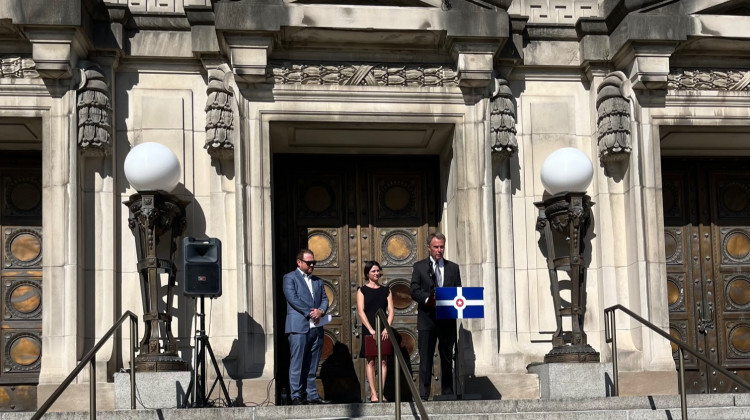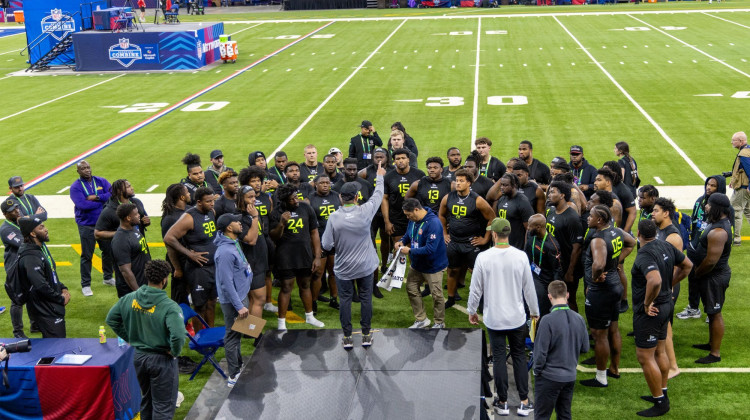
Former Indianapolis Public Library employee Bree Flannelly addressed the board May 24 to discuss her experiences with discrimination.
(Screenshot)This story has been updated to include a comment from Indianapolis Public Library Board President Jose Salinas.
Indianapolis Public Library leadership are quick to share the work they’ve done in dismantling systemic racism: building branches in underserved areas, broadening collections to represent minority communities and creating an equity plan following the 2020 protests.
If you ask many former and current Black employees, though, you’ll hear a much different story. Former and current employees have described racism, ableism and sexual harassment from library workers and leadership.
During a virtual board meeting May 24, former library employee Bree Flannelly detailed her experiences as a Black woman within the organization. The conversation got off to a rocky start when board President Jose Salinas, a judge in Marion County Superior Court, muted Flannelly before she could share her experiences.
“I was trying to protect everyone’s right to privacy,” said Salinas, who was concerned Flannelly might discuss personnel issues. "… I’m not making excuses. If the perception is I handled it poorly, that’s on me. I acknowledge that I relied too heavily on what I do as a criminal court judge, and how I handle Zoom court cases. … I’m disheartened if anyone thinks I’m not sensitive to diversity issues.”
She was unmuted after board members Patricia Payne and Khaula Murtadha — both Black women — told Salinas to let her speak.
In her address to the board, Flannelly said she felt “dismissed” during her five years at Central Library. She reflected on several instances of racist rhetoric coming from library staff and leadership, including staff members referring to Black patrons as “porch monkeys.”
In an interview with the Indianapolis Recorder, Flannelly said library staff frequently exhibit “racist, homophobic, sexist and ableist” behavior. Flannelly said these biases frequently impact the level of service Black and minority patrons are given and create a “toxic” work environment for workers of color. For example, Flannelly, who has attention deficit hyperactivity disorder, said an unnamed supervisor expressed concern that she “lacked the ability to follow through” when she pitched programs.
IndyPL CEO Jackie Nytes, who has served in that position since 2012, acknowledges the library “isn’t perfect,” but everyone in the organization is “on a journey.” She said anti-racism efforts from leadership are “extensive, sincere and engaging people at all levels of the organization.”
Payne, who has served on the board for six years, said while the library is doing great things — such as requiring staff to go through Indianapolis Public Schools’ racial equity training and expanding branches — it isn’t enough. She said racism, sexism and homophobia are rampant in the organization, and administrators of color are usually treated far better than Black staff members.
“The library is run like a plantation,” Payne said. “You have the house employees, which is not the word I want to use, but they’re receiving favor and the field employees are receiving punishment.”
Payne said after the board meeting, she and Murtadha received letters from staff — all afraid to come forward — about their experiences with discrimination. Payne, however, isn’t worried about speaking out.
“Why should I be worried? I’m telling the truth,” Payne said. “Somebody has to stand for the truth. … Somebody has to speak up for those who are hurting.”
Payne has remained on the board because she knows the importance of a library in a community. But to be effective, she said, library staff have to know how to work with a diverse community.
According to Payne and others, the controversy isn’t limited to library staff.
Nytes has faced controversy for making racist remarks. After Chinese visitors came to Central Library, Nytes commended staff for handling “those Chinese people,” a statement she said was taken out of context. Further, staff members said she referred to a Latina teenager as a “Mexican jumping bean,” an allegation Nytes denies.
Flannelly, who served as an activities guide at the library, left her job in February after her health began to decline, which she attributed to stress from the job. Flannelly described “constant gaslighting” from Nytes and her supervisors. She said one incident of bullying from her supervisor was swept under the rug. Nytes said an investigation into Flannelly’s allegations took place but could not disclose what happened to the employees in question, citing personnel issues.
Flannelly made her intention to address the board known beforehand. On May 21, Nytes sent an email — obtained by the Recorder — to board members, implying Flannelly was fabricating the discrimination she faced.
“I want to give you a heads up that we will have a former employee coming to speak at the board meeting during the public comment section,” Nytes said in the email. “This is the young woman … I mentioned in an email two weeks ago who sent us a letter of concern about her perception that two employees in the Curve at Central need to be demoted because they created a toxic work environment and were not qualified for their positions.”
The email went on to say Flannelly was upset because her friends didn’t get promoted or hired, an allegation Flannelly called “ridiculous.”
“That’s just nonsense,” Flannelly said. “This experience has just been hurtful, being told that the constant harm I’m facing isn’t a big deal and that I’m not capable of perceiving reality. I felt like, no matter what I do in that workplace, people will find a way to demean, discredit and disrespect me.”
According to Nytes, complaints of racism and discrimination from workers are few and far between. For any Black staff raising concerns, Nytes hopes they consider the changes being made in the organization.
“I would want them to reflect on what’s really happening and really make that list of what things are really going on,” Nytes said. “What are the steps that are being taken, how have people really been treated, what commitments have been made in the strategic plan? … I think it’s important to make a fair assessment about our situation, and I don’t think it’s anywhere near as negative as some are portraying.”
Flannelly said this is Nytes gaslighting Black library staff.
“People have been terrorized there to the point they wanted to leave,” Flannelly said in response. “It’s sad because so many people are afraid to speak up, because they just want to do their jobs … I have so many things going on in my life, I don’t have the energy to make up nonsense. The stuff I brought up literally happened.”
Beyond racism allegations, library leaders have been accused of covering up sexual harassment. A current employee, who asked to remain anonymous to protect employment, said a former supervisor told a patron seeking career advice she “could be a pole dancer, but you’d have to get in better shape.” According to the employee, library leadership considered the statement a joke.
IndyPL did not respond to request for comment on this issue, citing a personnel issue. However, the library did confirm the supervisor in question is no longer employed.
Flannelly has called for an external investigation into library leadership and said Nytes stepping down would be a good path forward for the library.
She isn’t alone.
Several former and current employees — many of whom spoke off the record out of fear of losing their jobs — also said Nytes should resign.
Former board member Terri Jett, who served on the board for three years, said a new CEO has “been a long time coming,” and Nytes’ treatment of Black staff has caused a retention problem.
“The library could have a greater impact if the employees of color, who are very knowledgeable and have a lot of expertise, were given the freedom to do their work,” Jett said. “They are not, and it’s out of blatant disregard and disrespect, and the evidence of that is there have been a lot of librarians of color who have left who probably would have stayed if they were respected and given the freedom to shine.”
One former employee, Sarah, who worked in IndyPL for nearly 14 years, said there was no way to safely call out racism in the library. After she quit, she was accosted by a former manager for sharing a social media post calling out racist practices in libraries. Sarah’s full name isn’t used because she worries her career could be jeopardized if she decides to return to a public library setting.
“Every Black employee has racism stories,” she said. “Someone would say something that would be racially insensitive, and if you complained, nothing was done, and you always feared retribution. And at smaller branches, people are going to know it was you who said something, so it was career suicide to complain.”
Michael Torres, president of the Library Workers Union and a current employee of IndyPL, said he feels safe speaking out because of his position in the union. He’s served as president for 14 years, and while he can’t say there weren’t racism concerns before Nytes became CEO, the issue is more pronounced since she took over in 2012.
“Issues do start at the top,” Torres said. “Jackie is our biggest problem. There are so many examples of how she dismissed Dr. Terri Jett and dismissed her opinion and expertise as a Black woman.”
For example, Torres referenced an incident where Jett asked for documentation to prove the increase of $400,000 was justified for children and teenagers coming to the Pike branch after school. Nytes refused, even though she answers to the board. Torres said this is just one example of a Black woman being disrespected by library leadership.
Stephen Lane, a special collections librarian, said many don’t speak out for fear of getting fired.
“I think she does have this air of being invincible and she can get through any kind of controversy,” Lane said.
Despite the criticism, Nytes said she has no intention of stepping down.
“I am not considering [it],” Nytes said. “We are very deep into some very important work, and the most important thing to do right now is to continue to move forward.”
While the inner workings of a library may not seem important to patrons, Flannelly said people should consider that libraries are a public service funded by tax dollars.
“All [IndyPL] tries to do is cover stuff up,” Flannelly said. “They’re literally wasting taxpayers’ dollars sending these people to trainings. They aren’t qualified to communicate with the community.”
This story was originally published in the Indianapolis Recorder, which is a partner of WFYI. Contact reporter Breanna Cooper at 317-762-7848 or follow her on Twitter at @BreannaNCooper.
 DONATE
DONATE





 View More Articles
View More Articles


 Support WFYI. We can't do it without you.
Support WFYI. We can't do it without you.